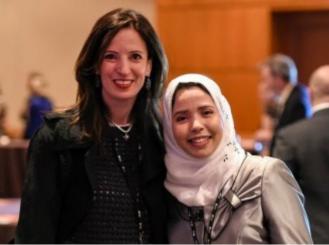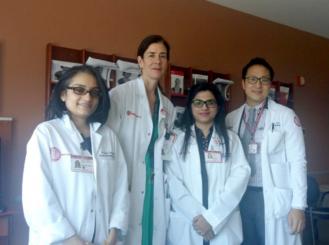By Anne Moore, MD
I have been part of the International Development and Education Award (IDEA) program at ASCO since 2005, when I met my first IDEA mentee, Dr. Debora Barton from Brazil. As a newcomer to the ASCO Annual Meeting, she was overwhelmed by its size and scope. With the guidance of the ASCO staff and the IDEA Working Group, and with the camaraderie of the other 20 or so grantees from distant countries, she was quickly oriented to this exciting opportunity. It was wonderful for her to have a mentor to help her over the days of the meeting, to introduce her to leaders in the field, as well as to young colleagues with shared interests. It was wonderful for me to see the meeting through her eyes. Everything was again fresh and exciting as we set up a schedule for the meeting with her expectations and experience in mind.
Since 2005, the IDEA program has expanded to include a 3-day post-ASCO Annual Meeting visit to the home institution of the IDEA mentor. At Weill Cornell Medicine, we have hosted IDEA grantees from Romania, Algeria, Pakistan, and Haiti. We communicate with the grantees before the visit to learn about their interests. We design an itinerary to include grand rounds, multidisciplinary tumor boards, hospital rounds, and visits to subspecialists such as gynecologic oncologists and radiation oncologists. Informal meals with the grantee and our fellows or faculty lead to very interesting discussions ranging from the future of global oncology to sharing photos of children on our iPhones!
In 2015, Dr. Eleni Andreopoulou and I mentored Dr. Khaoula Mazouzi from Algeria. She is a medical oncologist with a special interest in palliative care, a new concept in Algeria. Her experience at Weill Cornell Medicine opened her eyes to two other areas of oncology: multidisciplinary care and research, both clinical and translational. After attending the multidisciplinary tumor boards, she decided to start similar programs in Algeria. To our surprise, her visit to a research laboratory at the medical school turned out to be enormously important for her. This was the first time she had stepped into a research laboratory. She immediately understood the concepts of translational research and clinical trials. She is hoping to inspire her colleagues and the medical leadership in Algeria to bring laboratory science and the clinic closer together.
Last year, Dr. Joseph Bernard, a medical oncologist from Haiti with a special interest in breast cancer, visited our program after the ASCO Annual Meeting. He told us that the meeting was a rich academic experience—but also frustrating because of the disparity of available treatment between Haiti and the United States. Early-stage breast cancer is almost unknown in Haiti; women present with advanced disease and palliative options are limited. He particularly felt that the lack of access to radiation therapy limited his options to help his patients. We were impressed with his experience and his knowledge as well as his approach to treating patients with cancer.
“Oncology is special because you’re not only a physician; you’re a psychologist, a teacher, a friend,” he said. “Not a lot of physicians are trained in oncology, so I feel privileged to be among them.”
This year, I was very proud to sponsor an ASCO abstract submission by Dr. Bernard on cancer and HIV… and it was selected for poster presentation at the 2018 ASCO Annual Meeting!
Dr. Nida Anwar came to the IDEA program from the National Institute of Blood Diseases and Bone Marrow Transplant in Pakistan. She spent 3 days at Weill Cornell Medicine with our bone marrow transplant team after the 2017 ASCO Annual Meeting. She was particularly impressed by the patients’ eagerness to learn as much about their disease as possible so that they can partner with their doctors to fight it.
“In our part of the world, patients have a very low literacy rate and rarely ask us about the disease they’re battling,” she said. “In the West, the people are so well aware. They come to the doctor with a pen, paper, and blood counts.”
She told us that this experience will influence the way she approaches her patients in Pakistan.
I look forward to meeting our two Weill Cornell Medicine IDEA grant recipients at the 2018 ASCO Annual Meeting. They will come from Ethiopia and from Bangladesh, which is a new country for the IDEA program.
Earlier this year, the Council of Fashion Designers of America asked my advice about supporting an international project. The Council conducts its cancer-related philanthropy through The New York Community Trust (I am on the Board of The Trust) through its charitable Fashion Targets Breast Cancer fund. I immediately suggested that The Trust and the Council support a young oncologist from a low- or middle-income country for the IDEA program. Their donation to ASCO’s Conquer Cancer Foundation will support a grantee and I can’t think of a better way to improve the care of patients with cancer around the world!
Dr. Moore is an attending physician at The New York Presbyterian Hospital and a professor of clinical medicine at Weill Cornell Medicine where she directs the Breast Cancer Survivorship Program. She has been actively involved in a number of ASCO’s professional development activities. She was the inaugural editor of ASCO-SEP®, past chair of ASCO’s Leadership Development Program, and she is a member of the IDEA Working Group.





Recent posts